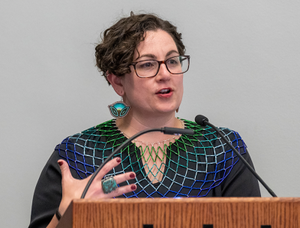When Professor Jenny L. Davis says her enchantment with language started at a very early age, she means it.
“I don't know if I came out of the womb loving it, but I might have, because I really have always loved language,” she said with a laugh. A citizen of the Chickasaw Nation, Davis is an associate professor of Anthropology and American Indian Studies at the University of Illinois Urbana-Champaign, where she is also director of the American Indian Studies Program. She is affiliated with the Gender and Women's Studies department and previously served as Chancellor’s Fellow of Indigenous Research & Ethics.
As a child, she filled notebooks with favorite poems and eclectic bits of writing. In middle school and high school, she was drawn to mythology, storytelling, and poetry. She reveled in Shakespeare’s playful prose and soaked up the poetry of Native poets Joy Harjo, Linda Hogan, and N. Scott Momaday, among others. She ultimately earned degrees in English, Spanish, and linguistics, thriving in spaces where multiple cultures and meanings intersect.
Davis’s love of language is evident in her latest book, the poetry collection Trickster Academy. The works call upon her observations and experiences within the academy, deftly moving between familiar topics and spaces (e.g., land acknowledgements, the classroom and its dynamics) in a disarming voice that is at times darkly humorous.
“I would say it's a Native thing in general—humor as a survival strategy and the ability to laugh and have dark humor about things that there would be no other response to,” she said. “I also think it makes it a little easier to talk about things that are incredibly difficult.”
Davis explained that while language is central to all cultures and peoples, historically, Native languages were targeted for extermination—preventing Indigenous cultural and community identity from being passed down generationally. “The ways we talk about ourselves, the ways we talk to each other, those are absolutely key to who we are,” she said. “Language is threaded throughout everything, connecting a lot of different aspects of our communities and culture. And it’s also a way of repairing and recognizing our ability to hold on to those cultural practices over a long period of time.”
See © Humanities Research Institute
